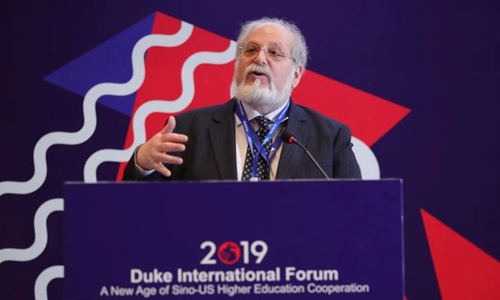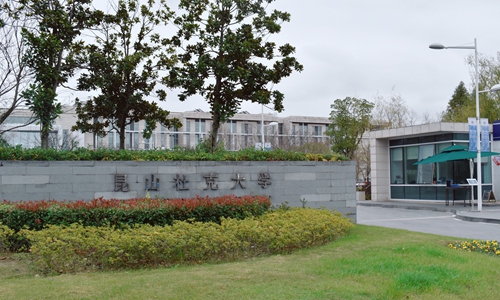HOME >> CHINA
Trade war challenges joint venture schools
By Chen Xi in Kunshan Source:Global Times Published: 2019/12/17 21:08:40

Denis Simon, the executive vice chancellor of Duke Kunshan University Photo: Courtesy of DKU

Duke Kunshan University Photo: Chen Xi/GT
China-US joint-venture schools should remain optimistic on the long-term prospects of educational cooperation between the two countries despite challenges from the recent trade tension, an official from Duke Kunshan University (DKU) said on Tuesday."I think all joint venture schools, especially the US ones, are experiencing the same impact from the difficulties in bilateral relations," said Denis Simon, the executive vice chancellor of DKU, during an exclusive interview with the Global Times at the 2019 Duke International Forum on China-US higher education cooperation in Kunshan, East China's Jiangsu Province.
Simon said China-US relations are experiencing one of the most difficult periods over the past 40 years, and have created some difficulties for joint venture schools in China.
The first point is the impact on visas. It is more difficult for both Chinese and US students to get visas and scholarships. The second is on recruiting faculty. Some people want to come to work and some parents do not want to send their children to study in these schools now, Simon said, adding that the school's procurement has been affected due to increased taxes of some equipment.
There are nine joint venture universities in China, and three of them are China-US joint venture schools, naming Duke Kunshan University, New York University Shanghai and Wenzhou-Kean University, according to China's Ministry of Education.
Simon said DKU is trying to be a good model for educational exchanges to make everyone feel "comfortable" with collaborations between institutions of the two countries. The university is developing in a friendly, steady way, like improving the satisfaction of students and facilities at the school.
Ryan Trombly, a US student at DKU, told the Global Times that she does not think the trade war affects her studies in China, and that she has had a very good experience so far.
According to DKU's website, the number of international undergraduate students including the students from US in DKU in the 2018-19 academic year is 88, or one-third of the university's undergraduate students, the same as in the previous academic year.
Simon said the relationship between the two countries is changing, and maybe very painful. "We are trying to figure out what the nature of that new relationship is, and how we could work together."
Simon explained that the world, including the US, did not expect China's rise to occur so quickly. "China's rise is not inherently a threat to the US. It is just that there is another significant player who can now influence the rules," he said. "I think the US has to adapt better to this new situation. I don't think it's a problem unless you really cannot adapt."
But Simon remained optimistic towards the future of China-US education cooperation because he thinks education should focus on the long term.
"The president of Duke University once described DKU as a beacon in the turbulent China-US relationship. In other words, if we want to do what we want, now is the best time. Maybe we face difficulties, but if we succeed, our efforts will have a greater positive impact on future bilateral relations. We need to focus on the next 50-100 years," Simon said in a speech at the forum.
China and the US agreed on Friday on the text of a highly anticipated phase one agreement, under which Washington has committed to roll back tariffs in phases and Beijing will increase its purchase of US products based on market demand. It marked a milestone first step in resolving the 20-month-long trade war, which has dragged economic growth around the world.
Posted in: SOCIETY